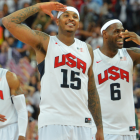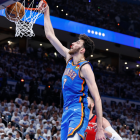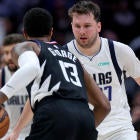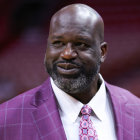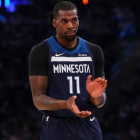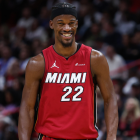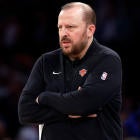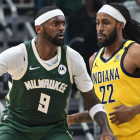
Carmelo Anthony joined an illustrious group of players on Monday when he officially announced his retirement from the NBA. On first glance, you might assume I'm talking about the club populated by legends like Charles Barkley, Steve Nash, Elgin Baylor and Karl Malone. That's the infamous "best players without a ring" crew, and it's a list Anthony certainly has a place on, but it isn't the only group of Hall of Famers he officially joined upon his retirement. The second one paints a more accurate picture of his basketball career.
The NBA started sending players to the Olympics in 1992. Since then, only four players have won a gold medal and an NCAA championship... without having won an NBA title. Patrick Ewing and Christian Laettner created the club in 1992. Grant Hill joined in 1996. Carmelo Anthony completed the trio in 2008, and then again in 2012 and 2016. Players who don't win rings are almost always defined by that single failure, but it's usually a woefully incomplete accounting of that player's body of work. The "everything except an NBA championship" club has a slightly better ring to it, doesn't it?
Anthony has won at every level of basketball. He finished his high school career with a 32-1 season at the famed basketball program at Oak Hill. That season opened with a 25-game winning streak, included multiple tournament victories, and even boasted perhaps the most famous prep basketball game ever played: a 72-66 road win in Akron, Ohio over St. Vincent's St. Mary's, which was led by Anthony's contemporary LeBron James. The two combined for 70 points in the duel, which was televised on ESPN and more than lived up to the hype. Anthony, who wasn't on the team at the time, helped avenge a 65-45 drubbing James engineered over Oak Hill the year prior.
He moved on to Syracuse after high school, where he led the most successful season in program history. Coach Jim Boeheim had reached the national championship game twice, but lost on both occasions. Anthony changed that in his lone season in upstate New York. In the process he led the NCAA tournament in scoring with 121 total points. The 778 points he scored in his freshman season remains, to this day, the third-highest figure ever reached in a single season by a Syracuse player. The two leaders, Dave Bing and John Wallace, were both seniors.
He was then drafted by the woeful Denver Nuggets, who had missed the playoffs in the previous eight seasons at that point. Anthony led them there in each of his seven full seasons as a Nugget. Not even James, who missed the playoffs in his first two seasons, could say the same, and Anthony got there in the far more difficult Western Conference. Couple that success with his Knicks tenure, and Anthony reached the playoffs in his first 10 NBA seasons and got there 13 times overall. He retired with a career record of 677-583.
But his best post-Syracuse work came on the international stage. Anthony competed in the Olympics four times, winning three gold medals and setting a Team USA scoring record that would eventually be broken by Kevin Durant. This is where the fabled "Olympic 'Melo" was born. The version of him that played more attentive defense and emphasized higher-value shots was an immensely valuable player in international competition, but for all of the cries for him to adopt that playing style stateside, his rosters rarely gave him such an opportunity.
Anthony spent the first 13 years of his career playing for the Nuggets and Knicks, but in all of that time, he had just three All-Star teammates: Chauncey Billups, Allen Iverson and Tyson Chandler. Iverson and Billups both arrived in Denver in their 30's. Chandler averaged 10.4 points per game during his All-Star season. In perhaps his best overall season, the 2012-13 campaign, Anthony scored over 10 more points per game (28.7) than any other Knicks (J.R. Smith, a reserve, finished second on the team with 18.1 per game, and no Knicks starter even averaged 15).
Anthony's poor circumstances were often the result of his own poor decisions. When James, Dwyane Wade and Chris Bosh signed three-year rookie extensions in 2007, Anthony could have followed suit and joined them as 2010 free agents. Instead, he opted for the financial security of a five-year deal, depriving him of the opportunity to follow Wade and James to Miami. When he did reach free agency four years later in 2014, he again passed up the chance to join a possible super team alongside Derrick Rose and Jimmy Butler in Chicago so he could maximize his earnings in New York.
By the time he did find championship-caliber teammates, he was incapable of holding up his end of the bargain. Anthony's one-year stint in Oklahoma City ended with a rookie Donovan Mitchell switch-hunting him mercilessly in the first round of the playoffs. The Houston Rockets gave him only 10 games to overcome those flaws and benched him when he couldn't. His career ended with slightly better stops in Portland and Los Angeles, but the stars never quite aligned for him on the playoff stage.
They often don't, just ask Barkley, Baylor, Nash and Malone. Only one team gets to win the championship at the end of the season, and no single player has ever done it on his own. It's rarely an indictment of their own shortcomings. Anthony won as a superstar at Syracuse with a championship-level coach and supporting cast. He won as a role player on the Team USA juggernaut. He just never quite found a similar set of circumstances at the NBA level, even if that was partially his own doing.
It's disappointing, but at least he's in good company. Ewing couldn't win it all in New York either, after all. Hill played with a number of star teammates across 18 NBA seasons and couldn't get over the hump. But all three did their fair share of winning as professionals and far more than that at every other level of basketball they played. That is what defined their legacies as basketball players. The lack of one, single trophy is just a footnote.













